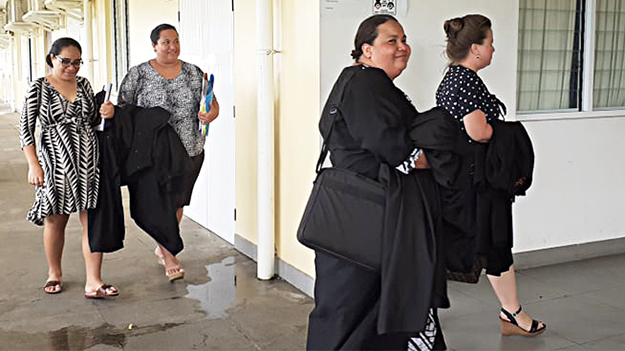By Staff Writer
Attorney General Su’a Helene Wallwork-Lamb is one of four respondents in a joint lawsuit over the choice of women candidates elected for the additional seats in Parliament.
General elections FAST woman candidate, To’omata Leota Norah, has filed legal action in the Supreme Court, against the election of Ali’imalemanu Alofa Tuua and Faagasealii Sapoa Feagiai.
Both are opposition Human Rights Protection Party, HRPP, candidates.
The elected women won the seats after they were declared with the most percentage of votes over other women candidates including To’omata, based on both the general election and by-elections results.
The Electoral Commissioner Faimalomatumua Mathew Lemisio and the Attorney General endorsed the official calculations the candidates nomination were based on for the women’s seats.
The To’omata legal action is supported by the FAST or Fa’atuatua ile Atua ua Tasi political ruling party, as second applicant.
The Electoral Commissioner is first respondent with the Attorney General as second respondent in the lawsuit.
Elected women MPs Ali’imalemanu and Faagaseali’i are third and fourth respondents respectively.
The legal action continues the controversial saga of the additional seats in Parliament to make up the 10% representation required for women under the Constitution.
FAST argued at the outset there should be only 5 seats. The Appeals Court, however, agreed with the 6 seats calculated by the HRPP based on the rightful percentage for women.
But the same court ruling delayed the official calculations only until after the by-elections that has now brought more legal arguments for the court to rule on yet again.
Both elected HRPP women candidates are still to be sworn-in to take up their rightful seats in the House.
House Speaker, Papali’i Taeau Masepa’u would not allow them to be sworn in, a week ago last Friday, together with the men candidates elected in the by-elections.
The Speaker declared in a press statement before the swearing-in, there were several court matters pending against the election of the women.
One of the court challenges referred to were doubts over whether the warrant of appointment for the elected women were “issued at the correct time.”
Also noted were questions about new petitions possible to challenge the by-elections result including the formula for the calculation of the 10% now brought by the To’omata lawsuit.
Papali’i defended his decision to hold off from swearing-in of the elected women MPs “unless the electoral petitions are determined and any by-elections (if any) arise from those petitions.”
